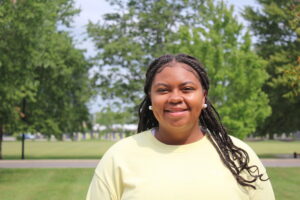The Emancipation Proclamation declared “that all held as slaves within the rebellious states are, and henceforward shall be free.” This executive order was issued by President Abraham Lincoln on September 22, 1862, during the Civil War.
When asked who had a great impact in African American history, senior Victoria Murray, named a famous Civil Rights leader.
“I would probably say Martin Luther King . . . I would say him because he kinda appealed to all audiences and didn’t really just focus on what Africa Americans need to do,” she said. “He . . . included others in his effort for change, so that’s why I would say him because he was more of like a global leader and not just like an African American leader,” said Murray.
Some of Dr. Martin Luther King Jr.’s most famous work was the “I Have a Dream” speech he gave to a group of civil rights marchers gathered around the Lincoln Memorial in 1963. Dr. King spoke of his dream with a United States free of segregation, and racism. The biggest march Dr. King gathered to protest, and fight for equality was on August 28, 1963 where about a quarter-million people participated in the historic march.
President Barack Obama, the 44th president of the United States who served for two terms from 2009-2017, was the first, and only African American president up to this day. Murray reflected on the impact Obama’s presidency had on the African American community.
“He showed like African Americans, and just like minorities that it was possible . . . seeing the representation, and knowing that it’s possible really just propelled African Americans to like move forward. Basically, just give African Americans a voice and say like you have a say in what happens,” she stated.
Murray had her input on what recent events with George Floyd, has meant to the black community.

“First I would say it has impacted negatively the black community because it has obviously shown us like we still have a problem, racism still exists, police brutality is still very much an issue, and basically that although we have come so far we still have so much work to do,” she said.
“Like some people look at it in the sense that nothing has really changed, or we have progressed backwards, but then I would also say it has motivated like every black person to do better, to seek out change, and to use their voice to be heard, and not just be silent, it has really given us a voice, and rallying everyone behind us so that everyone can see,” Murray added.
Peaceful protest is possible following the example of leaders mentioned including Rosa Parks, known as “the mother of the civil rights movement.” The most known incident was the struggle for racial equality when Parks refused to give up her bus seat to a white man in Montgomery, Alabama. Parks was arrested, and the Montgomery Bus Boycott was launched by 17,000 black citizens.
“I think protesting peacefully can get attention, boycotting businesses where business owners on a large-scale boycott,” said Dr. Owens on peaceful protesting.
“It wouldn’t surprise me if students decided to do some sort of demonstration, some sort of peaceful protest on campus. That’ll be fine, college campus is one of the primary places where activism takes place, and where protest happens. So, I think we’ll be good for students to have a peaceful protest, and talk about their concerns, and the issues on the campus.”
“I feel like how we’re gonna get there is through inclusion like everyone knowing they have a place in this world, knowing they’re here for a reason, and they all fit in no matter what color you are, like how you think, your sexual orientation. I think once we can come to terms with who we are, we’ll really get to world peace, ” Murray concluded with hopes of fair treatment for all people.
Page 5 9-22-2020
